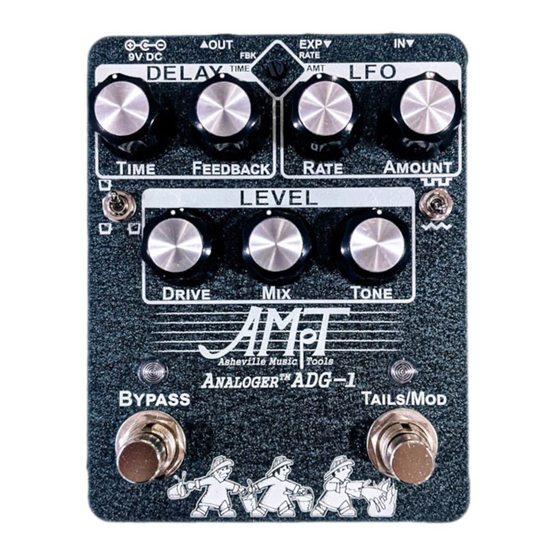Ampt ANALOGER ADG-1 Podręcznik użytkownika - Strona 12
Przeglądaj online lub pobierz pdf Podręcznik użytkownika dla Pedał muzyczny Ampt ANALOGER ADG-1. Ampt ANALOGER ADG-1 20 stron. 100% analog bucket brigade delay

FOOT SWITCHES
BYPASS FOOTSWITCH: Turns the effect on or off. The LED is lit
when engaged. The switch is user selectable for true bypass or buffered
bypass by a selector switch inside the ADG-1.
TAILS / MOD FOOTSWITCH: Depending on the mode (set internally),
this switch will either engage or disengage the LFO modulation or provide
Tails (also known as Spill Over or Trails). In tails mode any sound in the
buckets and feedback loop will continue to sound or fade out (depending
on the FEEDBACK setting), however any new sound will play over this
sound and not add to the delay. The LED will flash at the LFO rate
(triangle only) while either of these modes are engaged and turn off when
not engaged.
UNDER THE HOOD SWITCHES
If you carefully remove the 4 screws holding the cover on to the back of
your ADG1 you will see 2 switches underneath the jack board on the edges
of the PCB. These are the ONLY user accessible options on your ADG-1.
They select two functional options for the pedal's behavior. Do not adjust
any of the carefully calibrated factory set trim pots.
TRUE BYPASS / BUFFERED BYPASS: Use this switch, on the left
side of the jack board, to select true bypass (Default) or buffered bypass. In
true bypass when the effect is not engaged the input is coupled directly to
the output and does not pass through any electronics. This could be a
potential tone or noise issue for long cable runs. In this case select buffered
bypass to use the internal JFET as a simple buffered output with
approximately a 4K ohm output impedance. Non buffered bypass may have
a slight gain loss depending on the impedance match. This is normal.
nd
MOD / TAILS: Use this switch to select if the 2
stomp switch acts as a
modulation kill switch (default) or engages tails mode. See above for an
explanation of how these two modes behave.
<12>
